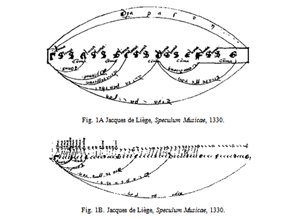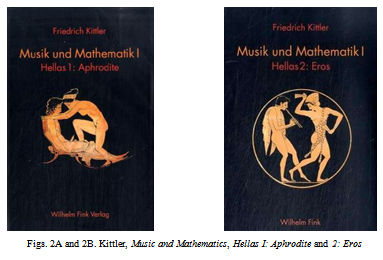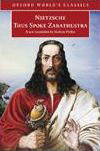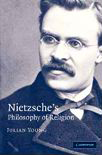- Home
- The Agonist
- Current Issue
- VOLUME V, ISSUE I, SPRING 2012
VOLUME V, ISSUE I, SPRING 2012
-
On the Phenomenology of Music and Word in The Birth of Tragedy or Nietzsche and Beethoven
By Babette Babich, Fordham University, New York City
You may download the entire book review as Adobe PDF format clicking PDF icon on the left. If you need some clarifications about copyright or usage rights, please contact us at nceditors@ietzschecircle.com.
Page 1 | Page 2
Music and Phenomenology: On Nietzsche's Hermeneutico-Phenomenological Investigations
What is intriguing, if to date unexplored, is that phenomenology is thoroughly if virtually unconsciously steeped in music. [27] Thus Husserl draws for his famous analysis of intentional consciousness of what is to come and what has been (protention and retention) on the consciousness of the past and future contours of a song in the midst of singing it: this is Augustine's classic image in his reflections on time in Book XI of his Confessions, as we also know that music is the art of time. [28] In this same locus, Augustine offers the kind of illustrations, from measure and quantity of the sound or the note that we also see in Nietzsche's early studies of "Greek Rhythm" as well as his "Rhythmic Investigations," and perhaps especially, certainly most strikingly, his "On the Theory of Quantitative Rhythm." [29]
F. Joseph Smith, who was both musicologist (as a specialist on the medieval musical theorist, Jacques de Liège) and phenomenologist, [30] illuminates in his book The Experiencing of Musical Sound: Prelude to a Phenomenology of Music [31] more than an instantiation of the phenomenological method, qua phenomenology of sound, but he focuses very specifically on the perception of music and not merely the generic notion of perception. In the spirit of Heidegger's specifically interpretive or hermeneutic phenomenology, Smith foregrounds as has rarely been done, even by Roman Ingarden the famous Polish phenomenologist of music, the very explicitly musical foundations of phenomenology as such. [32] In this way, Smith is able to remind us that Husserlian Abschattungen - or profiles - should be heard as nothing less than soundings, as I would say: echoings, resonances. For Smith, musical tonality turns out to be crucial to "the cardinal concept of Wesenschau" in Husserl's phenomenology, [33] arguing in particular that the musical model may be seen "in detail in the lectures on time-consciousness and on passive synthesis." [34] For Smith, Husserl's own background context matters as reflected in the critical fact that Husserl dedicates his Logical Investigations to Carl Stumpf, [35] which entails for Smith that when Husserl refers to Augustine on time - where, once again, Augustine uses the example of time, the meaning of time, and hence phenomenological speaking, the instantiation of time consciousness as this is directly given to us when singing a given psalm, time unfolding and then echoing, resounding point to point, full presence of recollected past verse and anticipated future of the song to come - protention and retention at once. Yet as Smith points out, there is always an opposition between theory and performance even in the same project. For this reason Smith can argue that musicology itself needs philosophy, particularly phenomenology and the dedication of phenomenology to science. Drawing on his own scholarly focus, Smith invokes the musicus of Jacques de Liège author of the Speculum Musicae, who as Smith reflects, "delights in the mathematical gymnastics of that ens numeratum which makes musical consonance possible." [36]
 It is the spirit of this
same ens numeratum, with all its
complexities for the tradition of rhythmic notion, [37] that also inspires Nietzsche's articulation of quantitative rhythm and more
recently, if very distinctly otherwise engaged, Friedrich Kittler's more
Helmholtzian studies of music and mathematics. [38] Today's media theorists in the efforts to get to a point they recognize - as
Nietzsche would say: in their enthusiasm for what they "already" know -
emphasize Kittler's initial reference to McCluhan's exultant advertisement of
his own discovery (or rediscovery of media beyond Harold Innis, beyond
Havelock's rearticulation of the role of oral and text culture in the
discoveries of Milman Parry and Albert Lord) and the more sophisticated among
them turn to Sloterdijk and others to highlight the relevance Kittler's closing
reference to Turing's legacy.
It is the spirit of this
same ens numeratum, with all its
complexities for the tradition of rhythmic notion, [37] that also inspires Nietzsche's articulation of quantitative rhythm and more
recently, if very distinctly otherwise engaged, Friedrich Kittler's more
Helmholtzian studies of music and mathematics. [38] Today's media theorists in the efforts to get to a point they recognize - as
Nietzsche would say: in their enthusiasm for what they "already" know -
emphasize Kittler's initial reference to McCluhan's exultant advertisement of
his own discovery (or rediscovery of media beyond Harold Innis, beyond
Havelock's rearticulation of the role of oral and text culture in the
discoveries of Milman Parry and Albert Lord) and the more sophisticated among
them turn to Sloterdijk and others to highlight the relevance Kittler's closing
reference to Turing's legacy.
 This eagerness
oversprings, as eagerness does, the heart of Kittler's reference: "In the
Ephesian Ionic, the dark syllables - short or long, high or low - merge into a
harmony all on their own. Heraclitus spoke in hexameters: αφ
ονια αφανης
φανερης
κρσσων. In
the Greek alphabet our senses were present." [39]
This eagerness
oversprings, as eagerness does, the heart of Kittler's reference: "In the
Ephesian Ionic, the dark syllables - short or long, high or low - merge into a
harmony all on their own. Heraclitus spoke in hexameters: αφ
ονια αφανης
φανερης
κρσσων. In
the Greek alphabet our senses were present." [39]
Nietzsche's literally phenomenological, which is in this context also to say hermeneutico-phenomenological investigations critically drive his explorations of the musical character of ancient Greek, [40] an exploration concerned with the relations between lyric poetry and ancient musical dance and musical tragic drama, but ultimately and above all, an exploration into the very literal music of the tragic poem itself, which precisely phenomenological hermeneutic depends upon Nietzsche's discovery of the musical resonances of ancient Greek. [41] And it is important to note here that where Heidegger offers us a hermeneutic phenomenology, as already emphasized, Nietzsche likewise elaborates his own scientific field of classical philology precisely phenomenologically, an adumbration which perforce includes monumental (archaeological) and literary history, language use and style, and all the methodology that we regard today, after Dilthey and especially after Heidegger and Gadamer, as hermeneutics.
For Nietzsche, a hermeneutic - or what he called an interpretive, in particular: a perspectivally interpretive - phenomenology corresponded in the case of the scholar to the artistic role of the science of philology corresponds to neither that of the poetic artist or musical composer but rather the philologist is, qua interpreter, a performer. In this sense, the classical scholar of classics undertakes or consummates a kind of making present or realization [Vergegenwärtigung] of the sort one can perform by articulating ancient Greek within the constraints, in Nietzsche's case, in the consideration and fully rigorous, that is to say the "chains" of rhythm and time - out of the spirit of music.
If the philologist cannot hope, as Nietzsche here argues, to match antiquity with the genius of the poet/composer, what the classical philologist can do is to aspire to call upon the ingeniousness of performance or practice, attending thereby to the effects of his own practices, without sparing self-criticism thereby. By recalling the music of the tragic art form, Nietzsche was thus able to explain how the tragic poet plays with the "thorn of suffering," as Beethoven plays with dissonance in his setting and indeed in his transfiguration of Schiller's words as tones in the Ninth Symphony, as we shall see that Nietzsche argues.
As already noted, the essential metaphor as Nietzsche deploys it in this classical context was a very musically technical one. [42] Musical dissonance, so Nietzsche would argue, was the operative metrical key to ancient tragedy just to the extent that sound was the heart of the ancient art form, where the goal was not to elicit, contra Aristotle as Nietzsche also argued, pity and fear but and precisely for the sake of beauty: "speaking well," as we cited this above.
Intoning the tragic poems one, as it were, plays - this is Nietzsche's tragic Vergegenwärtigung - the past. Hence Nietzsche as early as his inaugural lecture in Basel suggested that the philologist disposes over a very scientific "art" as he spoke of it there, as we also know that he conjoins art and science in his first book and throughout his writings. The classicist, for Nietzsche, is virtuoso, as it were, able to sight read or sing the "music" of antiquity to life and thus "for the first time to let it sound again." [43] At this juncture, Nietzsche thereby offers a first articulation of the musical dynamic and radical insights [44] of his first book, The Birth of Tragedy out of the Spirit of Music.
Nietzsche's resolution of the question of tragedy in his first book was declaredly, literally musical (BT §22), taken with phenomenological reference to philological practice as referring, as it were, to the words themselves, to spoken Greek as it was sung - it was Nietzsche's insight that it could only be sung or musically declaimed as he writes - on the tragic stage of antiquity, but not less with reference to the paradoxical question that for Nietzsche illuminates the problem of both pleasure and pain in ancient Greek tragedy. It is this paradoxical question that takes us to dissonance, a paradoxical echo that begins already with the first lines of The Birth of Tragedy, where he speaks of the duplicity of the Apollonian and the Dionysian - and most discussions attend to this dyad - which he expresses in terms not only the antagonistic duality of the sexes and the species resolution of the same but also in terms I have been calling phenomenological. This is no mere metaphor as we recall that Nietzsche declares:
“...we shall have won much for the science of aesthetics once we perceive not merely with logical insight [logische Einsicht], but with the immediate certainty of intuition [Anschauung] that the continuous development of art is bound up with the Apollonian and Dionysian duality: just as procreation depends on the duality of the sexes, involving perpetual strife with only periodically intervening reconciliations. (BT §iii)
Indeed, in this later-written attempt at a self-criticism, Nietzsche emphasizes, that for classical philologists concerned with his theme "nearly everything yet remains to be discovered." (Ibid.)
Nietzsche's concluding reflections on "What I Owe the Ancients" in his Ecce Homo echo his allusion to the phenomenon of "musical dissonance" (BT §24), also recall his description of the "becoming-human" (BT §25) of such dissonance in his conclusion to his first book. The musical "dissonance" of which Nietzsche speaks must be heard in each case, especially as it appears at the conclusion to The Birth of Tragedy out of the Spirit of Music (and the full title matters as we see in this context), qua compositional notion in the 19th century context of what Nietzsche called harmony and thus in terms of the play dissonance, which is historically underway to what later after Stravinsky and Schoenberg comes to be called the "emancipation of dissonance." [45]
Aspects of Nietzsche's musical explication of the tragic as such a "becoming-human of dissonance" may also be heard in the "damaged" resonances of Adorno's reflection as indeed in Günther Anders' phenomenology [46] of music in the modern era of not only mechanical reproduction, as Anders' cousin, Walter Benjamin argued with respect to photography and film but also, as Robert Hulot-Kentor is careful to emphasize, technological and today indeed explicitly digital reproduction. [47] This point requires attention to Heidegger as well as Adorno's insights into the today technological conditions of musical reproduction, not merely qua recording but also performance. And to this extent I have sought elsewhere to consider the role of performance, as Adorno also emphasizes this, articulated in Leonard Cohen's 'broken Hallelujah."
Drawing on 19th century musical theory to make his own case but also contemporary work in psychoacoustics, David Allison has shown us that Nietzsche drew upon the then-current resources of cognitive science and musical theory, using the findings of psychology to make his case with regard to the phenomenon of Greek music, in word and culture, emphasizing that Nietzsche draws upon his own experience of the Dionysian as an experience of "a dizzying state of transfiguring ecstasy." [48]
As Allison notes, Nietzsche reflects upon his own experience not of music as inchoate or as beyond word but rather in the individually dynamic experience of musical dissonance, which same experience, as Allison cites Nietzsche's reflections at the end of his The Birth of Tragedy out of the Spirit of Music (and here we see how much we need Nietzsche's initial, first full title, a title he himself would change directly in response to the book's lack of initial readers) as it is music as Nietzsche understood it here that gives us "an idea of what is meant by the justification of the world as an aesthetic phenomenon." [49] Inasmuch as Nietzsche also specifically invokes the "joyous sensation of dissonance in music" (BT §24) he refers to Beethoven's Ninth Symphony. Allison reminds us that this is not only a musicological conception - as I have already noted is also on offer in Beethoven's own writings as Nietzsche would have taken his theory of harmony or notes on composition to be Beethoven's [50] - which writings on composition were influential for both Nietzsche as for Wagner, but and again we need to reflect that Nietzsche also represented his own discovery of the pitch ictus using musical notation as well as references to musical works and illustrations drawing upon musical practices. Indeed, when Nietzsche emphasizes in his notes the incomparable difficulty of imagining the experience of ancient tragedy from the modern viewpoint, by way of a very phenomenological reflection of the need to consider and bracket the assumptions that go with our understanding of musical works of art in order to conceive the performance of ancient Greek tragedy, in bright daylight, one tragic work of art after another, but above all and precisely where everyone listening would be expected to catch the least false note - and only Father Owen Lee comes close to following Nietzsche's recommendations, without emphasizing these as such, in his valuable Athena Sings. [51] Thus in The Birth of Tragedy and related lectures, Nietzsche sought to explore the physical and psychological experience: "the 'phenomenon'" as Allison emphasizes it, "of 'musical dissonance,' is the Dionysian state of ecstasy." [52] For Allison - and as one might argue, for Bataille as well - what is at stake entail or implies a phenomenology of musical experience:
“...In addressing exactly what the object of music is (i.e., the theoretical model of its subject matter), Nietzsche realizes that its object (Gegenstand) is given to us as the content (Inhalt) of our own intensely undergone aesthetic experience, our ecstatic states of dispossession. This musically charged state of ecstatic disposition is precisely what he terms "the Dionysian state," and such a state is effectively the entire field of experience, shorn of simple subject-object relations. [53]
Allison connects this focus with Nietzsche's further explorations of the "Dionysian" in terms of "the most natural and extreme states of intoxication and frenzy," [54] and emphasizes that modern studies of musical cognition support the phenomenological insights of Nietzsche's "focus on dissonance as 'the primordial phenomenon of Dionysian Art.'" [55]
Music and the "Becoming-Human" of Dissonance in The Birth of Tragedy
Nietzsche refers to Beethoven through The Birth of Tragedy, at the start but and especially at the end when he refers to a dissonance rendered human, as Beethoven also is associated even in his day with such a humanization, as this "secular humanism" despite its contemporary currency must be set in historical context as the musicologist Ruth A. Solie illustrates. [56] Tacking between the complex history of mythologizing (and often concomitant demythologizing) has more than its share of pitfalls, but Solie cites Dannreuther's reflection (and there are echoes of this is Adorono, that set Beethoven as the "first to become conscious of the struggles and aims of mankind en masse, and he is the first musician, if not the first poet, who consciously offers himself as the singer of humanity." [57] Like the Wagnerian, Franz Brendel writing in 1854, and F. Laurenein in 1861 and very specifically with respect to the Missa Solemnis and God becoming man [Menschwerdung], Fritz Volbach makes a similar claim regarding Beethoven in 1905, both using the same terminology Nietzsche uses, as Nietzsche himself also uses Wagner's favorite term, as Brendel glosses this as the "becoming-human of music," [58] setting dissonance in the place of music, as Wagner also varies the notion of a deus ex with the 'becoming-human of mechanism.' Point for point, Nietzsche engages Wagner and as Solie already suggests, and as my reading here confirms, there would be fairly early in Nietzsche's works a turn contra Wagner.
All content copyright © Babette Babich - Nietzsche Circle. All Rights Reserved.
The Agonist
Featured in the Agonist
-
Nietzsche, Music, and Silent Suffering An Introduction
By Yunus Tuncel, The New School University, New York City
...Focus on the impact of Nietzsche's knowledge of music on his philosophy and the development of his thought.
-
Nandita Biswas Mellamphy's The Three Stigmata of Friedrich Nietzsche: Political Physiology in the Age of Nihilism
Reviewed by Julian Jason Haladyn, University of Toronto...A battle has been waged around Nietzsche's philosophy since at least the time of his unfortunate collapse concerning the manner in which his ideas are framed and interpreted, organized and understood in relation to the conditions of modern thought, which he helped foster...
-
Music, Posthumanism and Nietzsche
By Stefan Lorenz Sorgner, Erlangen-Nuernberg...the first order Empfindung associated to music is the dissolution of individuality which from a posthumanist[1] perspective brings about the realisation of the embeddedness of human beings in this world. Hence, music can bring about more than pain and pleasure in the recipients.
-
Thus Spoke ZarathustraBy Friedrich NietzscheA new translation by Graham Parkes
Oxford University Press, 2005
Reviewed by Horst HutterThis new translation of Nietzsche’s magnum opus is by far the best available in the English language. It should find its way to the desk of all students who do not have access to the original German.
-
Nietzsche’s Philosophy of ReligionBy Julian YoungCambridge University Press, 2006
Reviewed by Horst Hutter,
Concordia UniversityEvery student of Nietzsche in the Anglophone world should read this book. It is a most able treatment of a much-ignored and much-misunderstood topic close to the very heart of the writings of this seminal thinker.
Support Us
Please consider donating! The NC is a not-for-profit organization. As an independent organization that receives no assistance from any institution, the NC relies on your magnanimity to sustain itself. Please help support the activities of the NC with a donation Donations of any kind, whether of money, services, equipment, or in-kind gifts, are all of great necessity and deeply appreciated.
Subscribe
To receive site updates, news, and announcement from NC via email. To do so, you simply need to provide your email address below.






